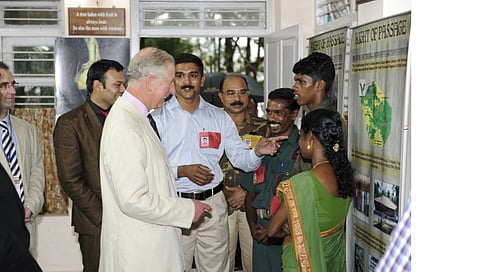

Guardians of the Forest
# Ajayan |
The journey to achieving the historic milestone of granting forest custodianship to indigenous communities was as arduous as the dense forests themselves, recalls Tiju Chiramannil Thomas, representative of the World Wide Fund for Nature-India (WWF India), which spearheaded this groundbreaking initiative.
Not long after completing his Masters in Social Work, Tiju embarked on his professional journey under the mentorship of veteran scientist S Sankar, then a senior scientist at the Kerala Forest Research Institute. Initially undertaking small research assignments under Sankar’s guidance, he eventually joined the World Wide Fund for Nature-India (WWF India) in 2008. Here, he took on the crucial role of coordinating sustainable resource management initiatives among the indigenous communities of Vazhachal, near Chalakudy in Thrissur district. This included the Kadars and Malayars, with the Kadars being classified as a Particularly Vulnerable Tribal Group (PVTG).
Establishing trust and gaining access to these communities proved to be a formidable challenge, given their deeply rooted traditions and guarded way of life. “The initial days were daunting. As my bike made its way toward the remote settlement of Mukkumpuzha, hemmed in by dam catchments on three sides, the very sound of its engine would send the villagers fleeing. Women would retreat into their homes, while the men would disappear into the depths of the forest. Yet, I refused to give up,” Tiju recalled.
Finally, after several months of patient effort, the village head (moopan) showed the first signs of acknowledgement. Though he was mute, a small group of men would linger instead of dispersing at Tiju’s arrival. Gradually, trust began to take root, allowing for the first tentative exchanges. Yet, it took nearly a year of perseverance before meaningful communication could truly begin.
Covering all nine villages in the Vazhachal division, Tiju engaged deeply with the indigenous communities, observing and learning their traditional methods of collecting non-timber forest produce. He initiated a systematic mapping of these resources using GPS, enabling the villagers to catalog their produce comprehensively. However, he soon identified an unsustainable harvesting pattern, which he sought to address by introducing improved practices. Tiju introduced the concept of a seasonal calendar, helping them align their harvesting practices with ecological sustainability and market demand. A portion of the harvested produce was sold to the Girijan Cooperative Society, while the rest was taken to the Chalakudy market. However, exploitative pricing left the communities with only a pittance for their efforts.
In 2008, the tribespeople received a mere Rs 90 per kg for raw honey, a price that barely reflected its true value. Recognizing the need for better processing and fairer compensation, Tiju facilitated interactions with an agency in Kothagiri in the Nilgiris, specializing in honey refinement. This collaboration led to the establishment of a honey processing unit in Vazhachal, significantly enhancing the quality and marketability of their product. The impact was transformative – raw honey prices slowly climbed to Rs 150 a kg and now commands an impressive Rs 700, ensuring a more equitable livelihood,
For a brief period, Tiju stepped away to pursue research at MG University. Following a short tenure at the Wildlife Trust of India, he returned to WWF in 2012. He also contributed to efforts in mapping forest areas to facilitate the implementation of the Forest Rights Act (FRA) along the fringes of the Mudumalai Tiger Reserve. However, his deep-rooted commitment to Vazhachal ultimately drew him back to the region, reaffirming his dedication to the indigenous communities and their fight for rightful custodianship of their land. He was instrumental in getting FRA implemented in neighbouring Parambikulam. He remained officially engaged with the people there till he quit in February.
He observed certain unique and deeply ingrained conservation practices among the indigenous communities. Drawing a parallel with the government-imposed trawling ban during the fish breeding season, he noted that these tribes, without any statutory directive, had long been practicing a similar form of restraint. They adhered to traditional ecological wisdom, ensuring that fishing activities did not disrupt natural cycles. Notably, they even used nets with larger mesh sizes to prevent the capture of juvenile fish, thereby allowing aquatic populations to regenerate sustainably.
Traditionally, honey collection is undertaken at night, a practice deeply rooted in their customs and ecological understanding. Interestingly, it is brothers-in-law who pair up for this task, guided by a profound sense of familial responsibility. “Their belief is simple yet powerful - if misfortune were to strike, the surviving brother-in-law would ensure the well-being of his sister,” explains Tiju.
With no high schools nearby, children must move to hostels far away, returning home only during vacations. This raises concerns that the younger generation may lose touch with their roots. To counter this, summer camps are organized, immersing children in lessons about their forests, traditions and the importance of conservation.
Though Tiju has officially moved on from Vazhachal since March, the bond remains unbroken. The tribespeople frequently reach out to him for guidance, a connection he deeply cherishes.
(Concluded)
